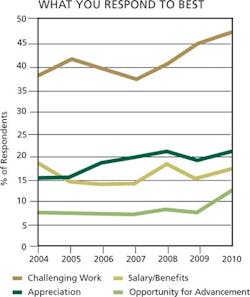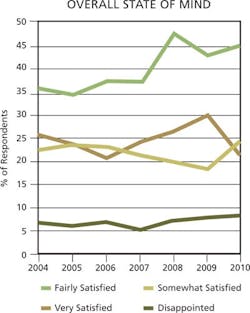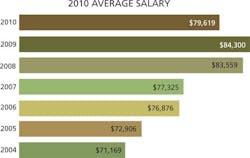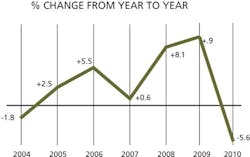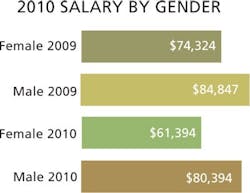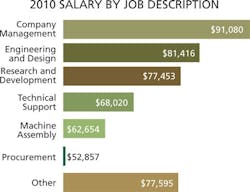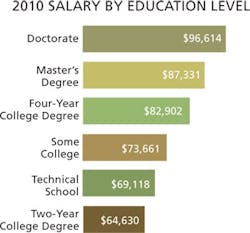They say that money can't buy you love. Apparently it can't buy you job satisfaction either. Although respondents to CONTROL DESIGN's 10th Annual Salary Survey certainly see the benefits of a decent pay rate, it's still not anywhere near the most important factor in providing you a satisfying work experience. That comes instead from having challenging work, and appreciation for your ability to handle that challenge.
Almost half of survey respondents said that challenging work was most important in providing a strong sense of job satisfaction. Next in line was appreciation with 22%, and then salary/benefits with 18%. Only opportunity for advancement came lower, with 13%. And thankfully, two-thirds of you are at least "fairly satisfied" with your job (almost one-quarter "very satisfied").
When asked in an open-ended question what the most satisfying aspects of your job are, a large majority of the responses centered on the challenge of the work, and seeing a job well done. Challenging work is very important, agrees Joe Stanley, controls engineer at Dematic (www.dematic.com), which manufactures conveyor systems in Grand Rapids, Michigan. "With the focus on cost being so great, if not for an interesting challenge the job would loose all appeal," he says. "There is a certain minimum that must be reached, but there has to be more than that. More money will not help you get out of bed in the morning, but an interesting problem will awaken you full of excitement."
Recognition for that work by peers, clients and managers also seems to help. On the other hand, when asked what the least satisfying aspects of your job/career are, many respondents pointed to a lack of appreciation and respect, and little understanding from management about the time and effort required to do a job well.
Going back to the salary question, however, is it actually that money can't buy you love? Or is there just not enough money being thrown at the problem? Respondents repeatedly threw up salary and benefits as two of the least satisfying aspects of their job, noting increased work hours for the same or even less pay than previously, especially when factoring in the increasing cost of health insurance.
Tracy Biddle, senior controls engineer at Miller Weldmaster (www.weldmaster.com), a machine builder in Navarre, Ohio, that makes custom heat-sealing equipment for industrial fabrics, says that he has been affected by the economic downturn no more than most, noting typical decreases in healthcare and other benefits packages that can have an effect on job satisfaction for anybody. He has also had to take on more responsibilities that might have been handled by somebody else previously.
"Taking on more job roles, less value in the compensation packages, and little to no increase in salary to compensate always affects job satisfaction," Biddle says. "Also, taking on more job roles usually means less time to refine and increase skills and develop new technologies, which in the long run can decrease sales and affect the bottom line." However, this last point is difficult to directly correlate, he adds.
More than 60% of survey respondents expressed concern about job security. More than half said that their companies have experienced layoffs in the past year, and more than half noted hiring freezes as well. In addition, 27% of respondents said that their companies had mandatory time off in the past year, and 32% of the companies reduced salaries.
"As everywhere else, we are expected to do more with less," Stanley says. "I am concerned with job security in the sense that I understand there is none; the day they feel I no longer add value, I am gone. If things have changed in the last year, it would be that with business picking up there is more to do and therefore less chance of layoffs."
Jim Fillmore, a controls department manager at HA Industries (www.ha-industries.com), which makes plastic welder machines just outside Detroit in Sterling Heights, Michigan, doesn't see job security as an immediate concern, but he is one of the respondents who experienced a reduced salary. And he's sure that if he lost his job he'd have to take a 30-50% pay cut to get another controls job.
Fillmore says he feels lucky to be paid as well as he does, but it's still not what it used to be. "At the end of 2006 my pay was changed from salary to hourly (about a 20% pay cut), and then I had to take a 10% pay cut," Fillmore says. "Recently, I was put back on salary at about 18% below what I was making six to seven years ago."
Fillmore doesn't seem to be alone. Despite a building recovery in the manufacturing sector and the economy overall, our annual salary survey saw a dip in the average salary for the first time since 2004—falling from an average of about $84,300 to about $79,600 this year. And that follows after less than a 1% rise the previous year. Even company management saw a slight dip, from about $91,900 to $91,100.
The reason for that almost 6% dip overall is a bit unclear. To start, we received twice as many responses this year as we did last: 1,009 responses vs. 502 last year. So perhaps it's only that we have a more representative sample this year. Another factor to consider is that we have more responses this year from Asia—12% compared with only 0.4% last year. And the average salary among those responding from Asia? About $57,700. And that's despite the fact that this demographic has essentially the same level education and experience as the overall response field.
Reflective of this trend, one could argue, is the concern expressed by our U.S. respondents about the increasing level of outsourcing in their industry, particularly to China. Almost a quarter (22%) said more jobs have been outsourced at their companies in the past year. One respondent pointed to the increasing amount of work that is being sent abroad, noting, "I've worked 30 years, and we're losing the manufacturing." Not only does that create an increased lack of job security, but people seem frustrated with the results that come back from outsourced jobs.
The women in this industry are working in an overwhelmingly male-dominated environment, with 95.6% of our respondents being male. This was brought into perspective by one female respondent, who said that one of the least satisfying aspects of her job was feeling left out in a "man's world" of balls and rollers. Like many other respondents, she also pointed to a lack of appreciation for the work she does. That lack of appreciation is reflected in pay rates too—an average $61,400 for the women compared with $80,400 for the men. And the situation seems to only be getting worse. The women in our response group experienced a more than 17% dip in pay from 2009, compared with an approximately 5% drop for the men.
More stats:
- More than a third (37%) of respondents were age 46-55, and almost 90% were 36 or older.
- Half of the survey respondents have a four-year college degree, 19% with a master's, and almost 3% with a Ph.D.
- Of the college graduates, almost half (46%) studied electrical engineering; mechanical engineering, 14%.
- Almost three-fourths (73%) have worked in machine control and automation for more than 11 years, and 18% for more than 30 years.
- More than half (57%) have worked for the same employer for 11 or more years; 28% for more than 20 years.
- More than half (55%) describe your job as engineering and design, working across a wide range of machine builder industries.
- Although salaries are fairly evenly spread across the board, the bulk of them (47%) fall in the $61,000-$100,000 range.

Leaders relevant to this article:


